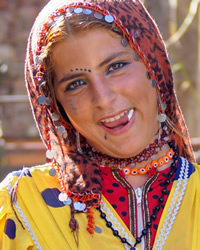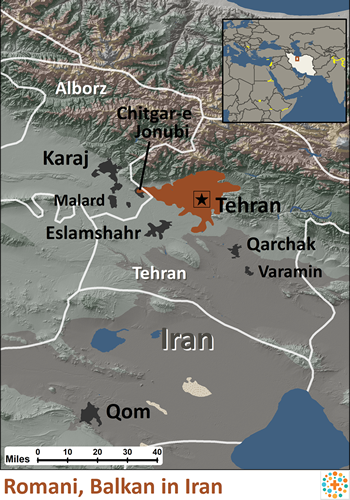Romani call themselves Roma, which in their language means "men." They derive Rom from the word Dom, meaning "a man of low caste who gains his livelihood by singing and dancing." The Romani language, therefore, comes from the name the Romani call themselves.
Romani have their roots in India. They began spreading westward in the tenth century. By the fourteenth century, there were large Romani groups established in the Balkan Mountains of Bulgaria. Some continued to live as nomads; others settled in permanent dwellings. Regardless of where they lived, though, to non-Romani, they remained mysterious and distinct. Curiosity about them eventually led to hatred and discrimination. In the twentieth century, the Nazis killed thousands of Romani. Today, they are still discriminated against. Many times, the population counts of Romani are inaccurate because of their nomadic lifestyle. Others do not possess identity cards because they fear discrimination or persecution.
The Balkan dialect of Romani borrows from both Greek and Turkish. For this reason, we call it a hybrid language.
The Balkan Romani are located mainly in parts of southeastern Europe, including North Macedonia, Serbia, and Bulgaria, but they also live in many other countries. A small number are in Algeria and Iran for example.
In the past, Balkan Romani were not allowed to own land, so they began developing unique occupations, which they still do today. These included fortune-telling, horse trading, market vending, entertaining, acrobatics, and metal and woodworking. They are especially known for their musical and dancing abilities. Many sing and play instruments at weddings, baptisms and festivals.
Unfortunately, they are also known as beggars and thieves. This reputation has caused much distrust and discrimination. In many countries, they are last in line for jobs. Some of the women work as domestic helpers, but they get paid meager wages. Many have insufficient housing and unsatisfactory medical attention.
The Balkan Romani are noted for being flamboyant. This makes them interesting, mystical, and sometimes misunderstood. In many situations, Balkan Romani people try to blend and keep their ethnic identity unknown.
Parents often arrange marriages. Young couples usually marry while in their mid to late teens. Often, they prefer to elope rather than to have a wedding ceremony. They expect girls to be sexually pure before marriage. Once married, she joins her husband's family and gains status and respect by having children.
Balkan Romani have maintained their religious traditions and beliefs. They believe that ghosts, lizards, and snakes can harm humans. They believe that men have the power to curse others by giving them the "evil eye." These beliefs have been blended with Shia Islam, the dominant religion in Iran.
No matter where they live, the Balkan Romani have one thing in common: the need for Jesus. There is a great need for intercessors and workers to make sure the Balkan Romani meet the Savior.
Pray for the Domari culture to be renewed and enhanced by a work of the Holy Spirit and shaped into a God-centered and God-honoring mold.
Pray for the Holy Spirit to move among Domari family and community leaders in Iran to seek his face and enjoy his blessings.
Pray for the Lord to thrust out workers who will be compelled to nurture a movement to Christ among the Domari people in Iran.
Pray that their dire conditions will soon lead the Domari to seek the One True God who yearns to give them the peace and joy of the Lord.
Scripture Prayers for the Romani, Balkan in Iran.
| Profile Source: Joshua Project |





























